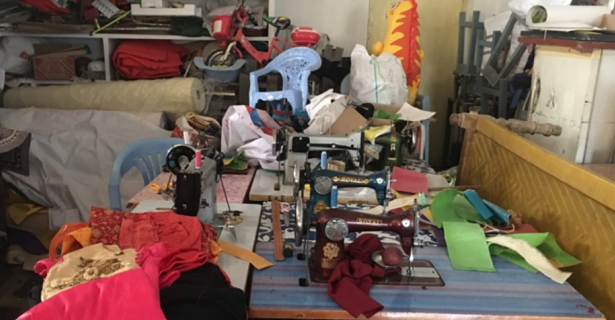As part of the Tufts International Development India team, this winter we visited several NGOs and communities in India in an effort to find a new project partner. The first NGO that we visited was Asha Sada in Ongole, Andhra Pradesh. Asha Sadan is an organization under the umbrella organization HELP. HELP focuses on rehabilitating women that have been in the sex trade, illegally trafficked, and abused. According to Asha Sadan, human trafficking is one of the largest problems in India and especially in Andhra Pradesh, which often is the origin, transit point and destination for trafficked victims.
Asha Sadan provides shelter for trafficked women, along with rehabilitation and various vocational trainings to help them fully reintegrate into society. Furthermore, HELP is involved with advocacy and raising awareness of child trafficking and exploitation.
In addition to the shelter for trafficked women, Asha Sadan also helps the government of Andhra Pradesh run a penitentiary for boys that have committed petty crimes and the sons of the women in the shelter.
However, what struck me the most was the concept behind the penitentiary. The main reason that Asha Sadan helps the local government run the penitentiary is because they believe that the crimes or violence committed by children are a product of the environment they were brought up in and they should not solely face the blame. Therefore, instead of sending children who commit petty crimes to jail, which would only fuel the intergenerational cycle of crime, they are instead brought to Asha Sadan where they receive help to break the cycle.
During our visit, we focused on first surveying Asha Sadan’s facilities and learning more about the work they did with victims of human trafficking. Then, we began to interact more with the people by listening to their unique stories, as well as asking them what they would like to see at Asha Sadan that would help their rehabilitation and reintegration into society.
We learned that although Asha Sadan already provides the women with some vocational trainings, such as learning how to bake and stitch embroidery, they wanted to have more varieties of training so that they have choices between different jobs and would be able to work independently. As we learned more about how each woman ended up at the shelter, our appreciation of the work of Asha Sadan increased. We realized that providing these women with shelter and food was the ‘easier’ part of the job but trying to affect how victims of trafficking are understood in the larger community as well as providing for the mental health of these women is an ongoing challenge.
In addition to the work at the shelter, HELP advocates and lobbies to create awareness of sexual trafficking among the surrounding community, government and private sector. Thus, HELP not only rescues victims but also actively works to prevent trafficking in the first place and prevent re-trafficking of rescued victims.
Throughout our time at Asha Sadan, we were able to experience not just development first hand but more importantly sustainable development. Personally, I felt that Asha Sadan’s model of not only reactively helping alleviate the issues that child prostitution and trafficking create, but also proactively trying to change the deeply integrated culture of sexism and abuse was what made them unique. Only by changing the mindsets of people can development be impactful and sustainable.
*Photo: Asha Sadan provides the women with vocational training, such as learning how to sew bags, to ensure that they have a means of supporting themselves after they leave Asha Sadan.

